The Roman empire was one of human history’s most fascinating and historically memorable periods. As can be expected from such a long and storied history, many notable leaders existed.
There were around 70 Roman emperors from the beginning of the reign of Augustus in 27 BC to the deposition of Romulus Augustulus in 476 AD. Let’s explore some of the best Roman emperors in history.
Antoninus Pius
No other Roman emperor is so highly praised for his impeccable moral character as Antoninus, for which he earned his appellation “Pius.”
Antoninus is undoubtedly one of Rome’s best emperors, and his reign was synonymous with peace and affluence throughout the Roman empire.
Titus Aurelius Fulvus Boionius Antoninus was born in Lanuvium, modern-day Italy, on 19 September 86 AD. He was born into a reputable family that had already held some of the most dignified and essential offices in various branches of the Roman state.
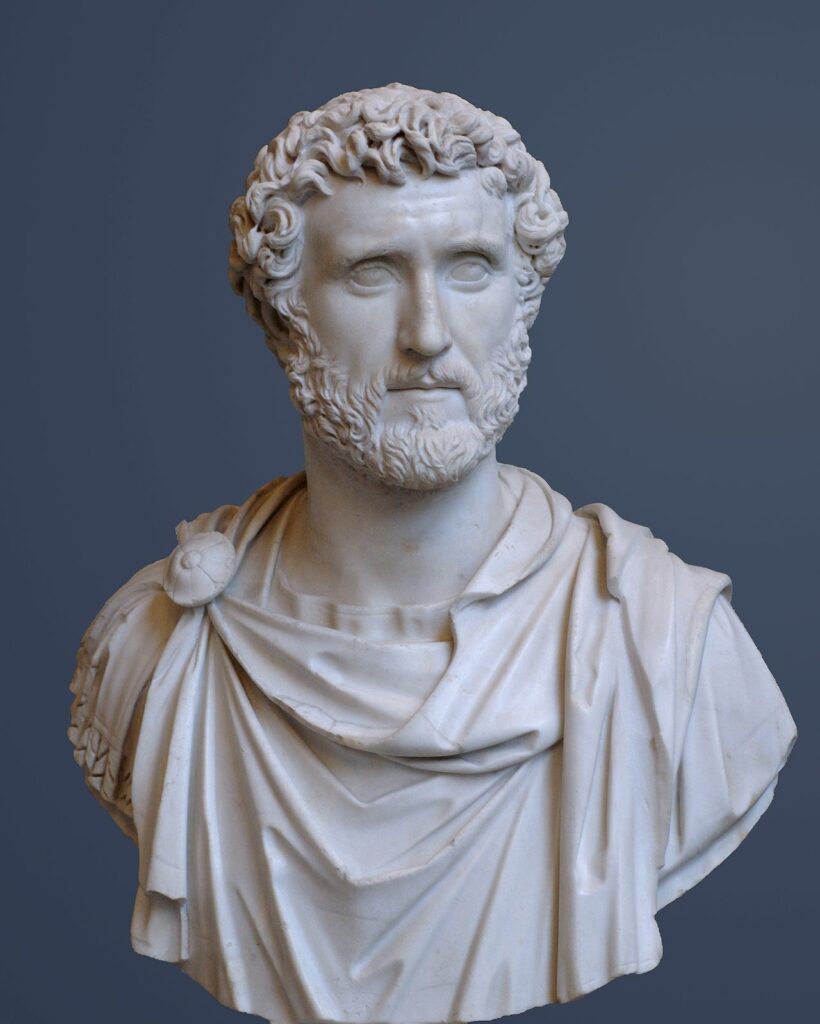
His father passed away while he was still relatively young, resulting in him being entrusted to both his grandfathers, who took charge of his upbringing and education. It has been said that this significant factor greatly influenced his character and instilled a pure and devout spirit in him.
Antoninus married Anna Galeria Faustina, also called Faustina the Elder. He went through the regular senatorial ranks and became consul in 120 AD.
Due to his impeccable character and prudent manner with which he discharged the duties entrusted to him, he found favor with emperor Hadrian. He was adopted as Hadrian’s successor in 138 AD.
Antoninus’ reign as emperor is considered the most peaceful reign in the history of the Roman empire.
Of course, some military shenanigans throughout the empire during his reign. Still, Antoninus never engaged in wars nor sought to expand the empire by conquering new territories.
Instead, he only sought to enrich it. Antoninus stood for duty and piety above all else, earning a reputation of kindness when he uncharacteristically pardoned senators condemned to death by his predecessor Hadrian.
Above all, Antoninus was an emperor who truly cared for the well-being of his people. He was an excellent administrator that substantially expanded the empire’s treasury, extended free access to drinking water, showed respect for the law, and even facilitated the enfranchisement of formerly enslaved people.
Marcus Aurelius had high praise for Antoninus in his book, Meditations, describing him as an admirable combination of “dignity and charm.”
Marcus Aurelius
Marcus Aurelius became emperor after the renowned peaceful reign of Antoninus Pius, only to ironically find himself embroiled in several wars and rebellious activities that lasted throughout his reign.
As a result, Marcus presided over the Roman empire during an incessantly troubled period. Shortly after his ascension to the throne, he was confronted with widespread revolts across several fronts, particularly from Germania and Parthia.
Along with the prevailing military unrest, Marcus had to deal with the pandemic known as the Antonine Plague, which spread across the Roman empire during his reign, taking the lives of millions, including his adoptive brother and co-emperor Lucius Verus.
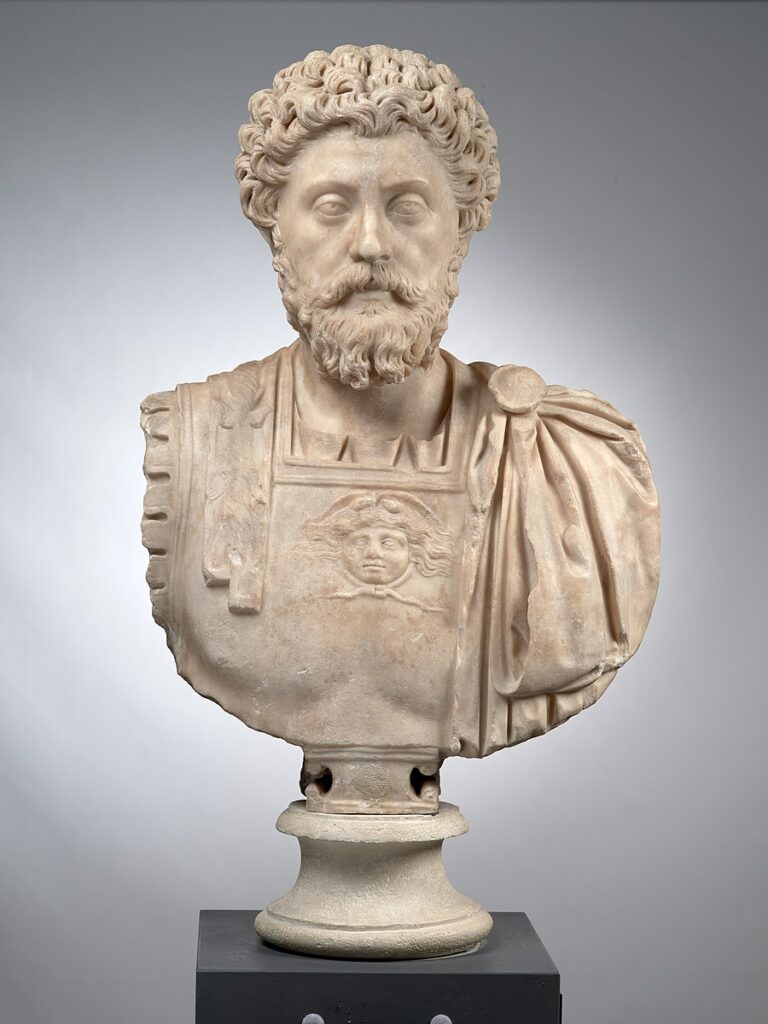
However, Marcus Aurelius overcame his political challenges, successfully quelling the revolts and defeating all the enemies who stood against him to the great admiration of his people. Dubbed the last of the Five Good Emperors, Marcus Aurelius ruled over his people judiciously from 161–180 AD.
A remarkable philosopher and writer, Marcus Aurelius is considered one of the wisest emperors of all time. He dedicated much of his life to philosophy and his written work, Meditations, which held records of his notes and ideas on Stoic philosophy.
Constantine The Great
Flavius Valerius Constantinus, more famously known as Constantine the Great, was a Roman emperor from 272 to 337 AD and the first Christian emperor in Roman history.
Constantine had a simple mantra, “One empire, One emperor, One Church.”
He oversaw the move and construction of the capital city of the Roman empire, Constantinople, named after himself, which became the most powerful city in the world.
Constantine grew up in the ancient city of Nicodemia, located in present-day Turkey. He was raised at the court of Diocletian and witnessed the emperor’s fierce and ruthless persecution of Christians, which might have resulted in his later tender approach to the faith.
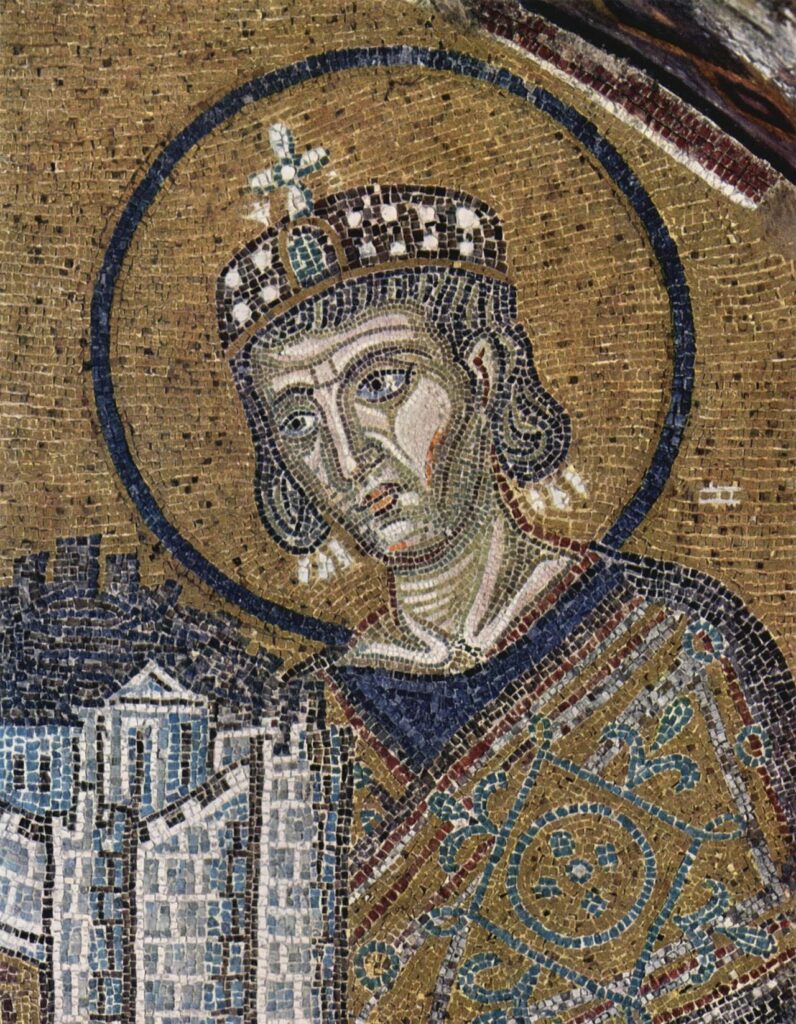
Constantine was proclaimed emperor after his father’s death in 306 AD. Amid the convoluted tussle for power, Constantine fought for many years to unite the Roman empire into a united front under his leadership.
A capable and charismatic soldier, Constantine went on to prove that his adversaries were no match for him, both on the battlefield and in the political arena.
He recovered and reconciled some Roman provinces long lost to barbarian invasions and launched successful military campaigns against tribes on the Roman frontiers, such as the Alemanni, the Franks, the Goths, and the Samaritans.
Constantine was devoted to promoting the interests of the Christian faith. He was noted to have ordered a cross, the Christian symbol, to be painted on his soldier’s shields. In addition, he oversaw and commissioned the building of several churches throughout his lifetime. Most notable among them was the Church of the Holy Sepulchre, built on the purported site of Jesus’ tomb in Jerusalem. It is considered the holiest place in all of Christendom.
His adoption of the Christian faith initiated a shift in ideology among Romans and significantly impacted the religious preferences of subsequent Roman emperors after him.
He was instrumental in laying down the foundations that saw the transition of the once notoriously pagan Roman empire into a Christian one.
Vespasian
Regarded as one of the most important figures of ancient Rome, Titus Flavius Vespasianus was born in 9 AD. He came from humble beginnings and rose through the ranks of the Roman army to become the founder of the Flavian dynasty that ruled the Roman empire for the next 27 years.
Vespasian came into reign during one of the most turbulent times in Roman history, which saw Rome having four emperors in one year, famously known as the Year of the Four Emperors.
The Year of the Four Emperors marked the first civil war that threatened to tear down the very fabric of the Roman empire. It was a period characterized by war, intrigues, and instability that led to the deposition of 3 emperors before Vespasian.
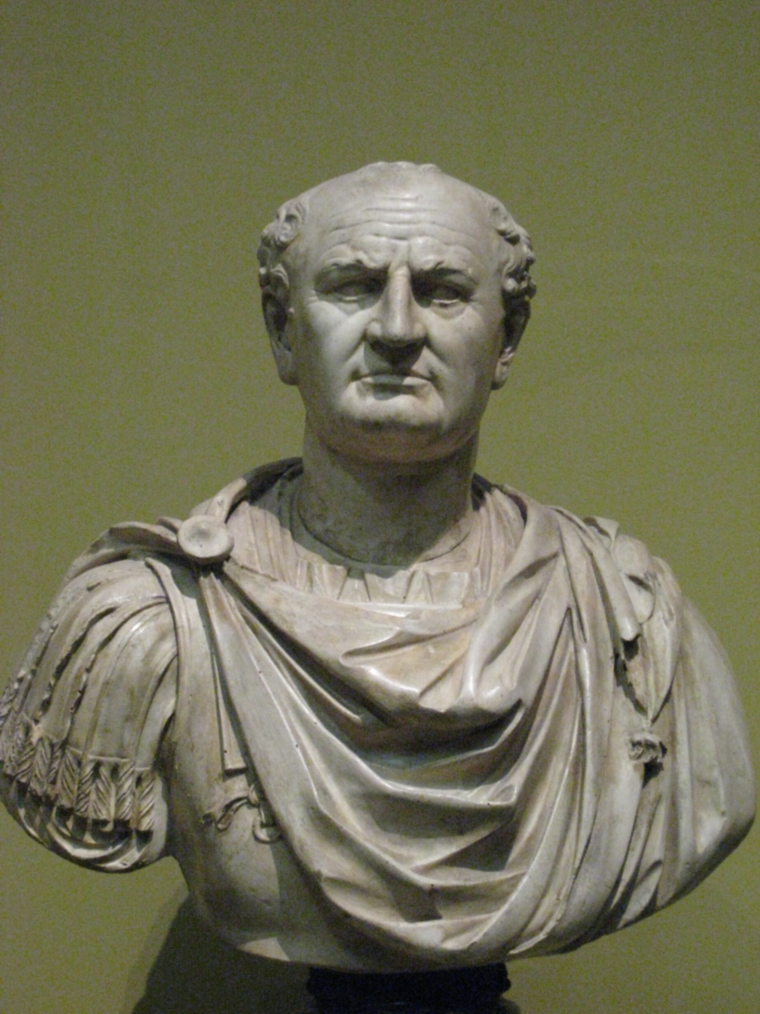
Before his reign as emperor, Vespasian was a competent and courageous soldier that built a reputation for himself from his military success. He commanded a legion of soldiers in Britain and Germany that participated in more than 30 battles and captured no less than 20 cities.
As emperor, Vespasian, in his reign of just ten years, was able to install order and stability in Rome following a period of great chaos. He successfully prevented the dissolution of the Roman empire, ensured civil peace, and enacted fiscal policies that aided the reconstruction, reconciliation, and rehabilitation of the ruins caused by the excesses of his predecessor, emperor Nero.
Vespasian had a coarse and no-nonsense personality but was also known to be a just and humane general who only used violence when necessary. He was an excellent builder as well as a great administrator. He and his son, Titus, oversaw the construction of the great Roman Colosseum, a masterpiece of roman imperial architecture that still stands to this very day.
After he died in 79 A.D., Vespasian’s eldest son Titus succeeded him as emperor, making him the first Roman emperor to be directly succeeded by his son and, thus, establishing the Flavian dynasty.
Trajan
Trajan was the most successful conqueror of all the Roman emperors and easily one of the most significant Roman generals of all time. Born Marcus Ulpius Traianus on 18 September 53 AD, Trajan was the first emperor born outside of Italy. Nerva adopted him as heir and successor.
Trajan’s magnificent reign lasted for 19 years and saw the Roman empire achieve unprecedented military conquests and reach its peak. During the reign of Trajan, Rome reached its largest size.
He oversaw the conquests of Dacia, Mesopotamia, and Parthia. The wealth acquired from the vanquish of Dacia enabled Trajan to fund social welfare and undertake many ambitious building programs that included bridges, roads, and a complex market arcade called the Trajan market, which is considered the world’s first purposefully constructed shopping mall!
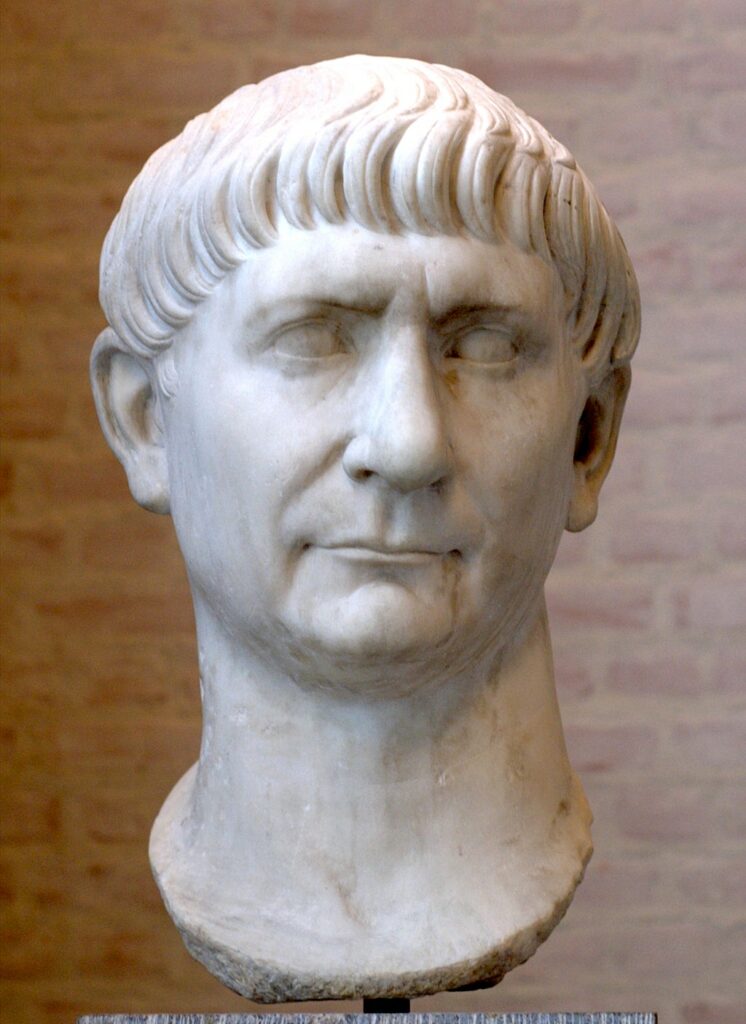
Truly a remarkable leader, Trajan commanded great respect and worked tirelessly to bring greatness to Rome and improve the quality of life of her people.
Christened Optimus Princeps (“best ruler”) by the senate, Trajan was revered by the military, the senate, and all the people of Rome. He commissioned building projects and engaged in welfare programs like reducing taxes for poor citizens and many other philanthropic endeavors.
He died in Cilicia while in a military campaign overseeing the destruction of Pathia, one of Rome’s greatest enemies. Trajan’s ashes were put in a cella at the base of Trajan’s Column, a triumphal column that details his spectacular military achievements.
Trajan’s column still stands gallantly in the center of Rome to this very day, a testament to his greatness, even several centuries after his death. After his death, senators were noted to bless future emperors with the saying, “More fortunate than Augustus and better than Trajan.”
Augustus
Augustus, the founder of the Roman empire himself, is widely regarded as the greatest Roman emperor in history and one of the greatest human leaders of all time. Augustus was a phenomenal ruler and master strategist whose importance to the history of Rome cannot be overstated.
Gaius Octavius, also known as Octavian, was born the great nephew of Gaius Julius Caeser but would go on to create a legacy that even surpassed his great uncle in many ways.
Some might expect to see the famous Julius Caesar’s name on this list, but he was not recognized as an “emperor.” The senate gave Octavius the title “Augustus” for his outstanding accomplishments. His successors would bear this famous title, “Revered One.”
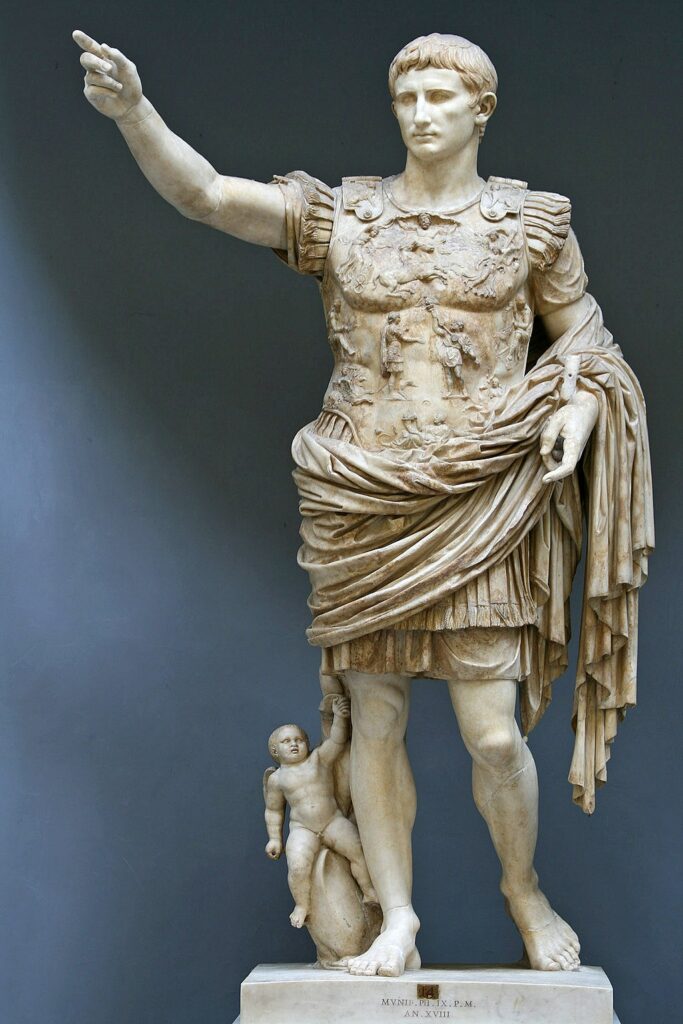
He rebuilt much of Rome, expanded the empire in nearly all directions, and laid the foundation for an empire that lasted for nearly 500 years. He was in personal command of all of the legions of Rome and, together with the roman senate, created a new constitution for this great new empire.
The reign of Augustus ushered in a new era of peace called “Pax Romana” to a generation of people that had known nothing but violence and a constant breakdown of political systems.
Most of the political violence and civil wars in the roman frontiers ceased after Augustus became emperor, and the Roman state was free of large-scale internal warfare until The Year of the Four Emperors.
Augustus had the longest reign in roman history, ruling for 41 years from 27 BC until he died in 14 AD. The month of August, previously called Sextillia, was renamed to honor Augustus because of several of his significant political and military accomplishments that occurred during the month.
On his deathbed, he was reported to have said, “have I played the part well?” Just as actors in a play would say.
There was a Roman empire because there was Augustus. Augustus was not just the first; he was one of the best Roman emperors and an ideal top pick for this list.

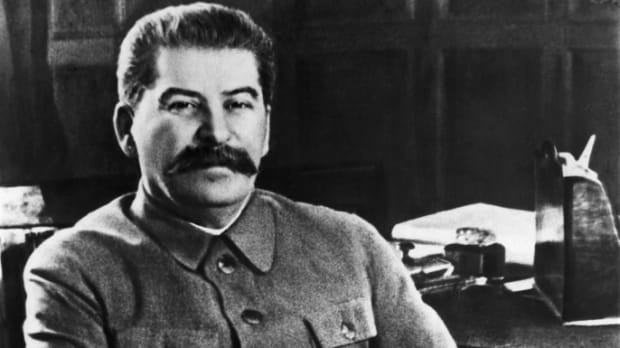
For the over 1.5 billion Christian on earth am pretty sure they connive with me that Constantine was the greatest of all..